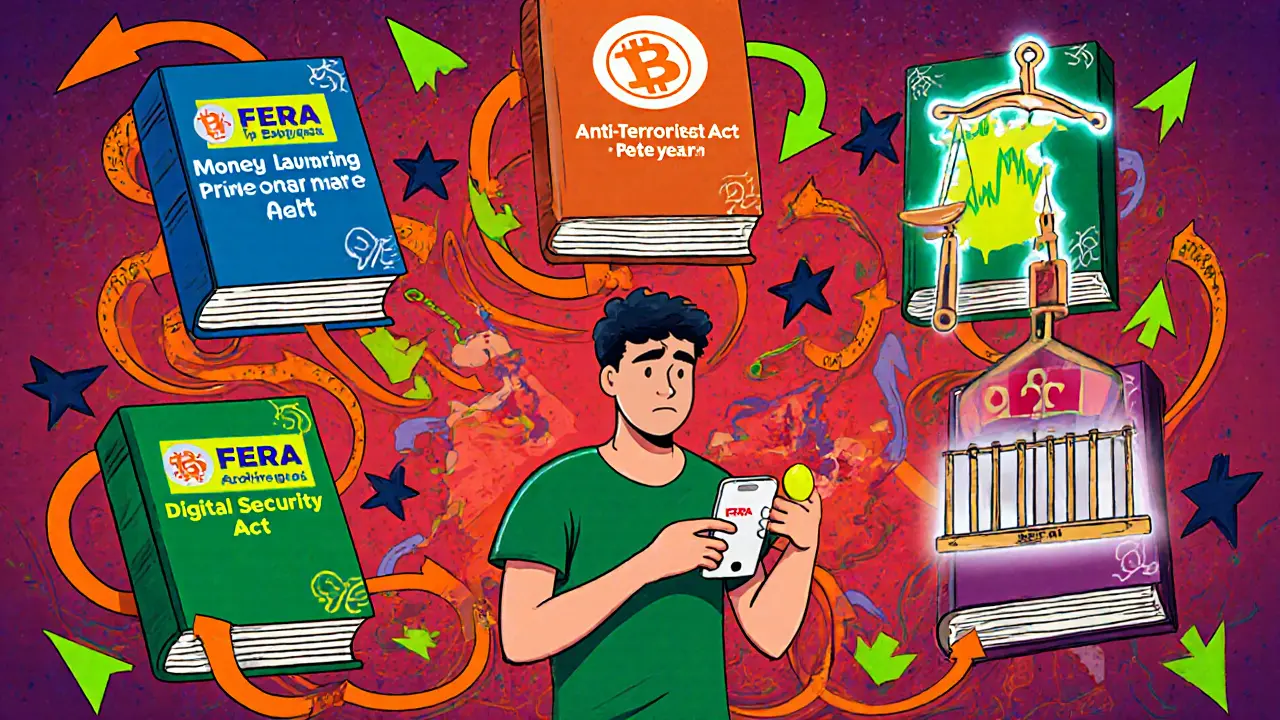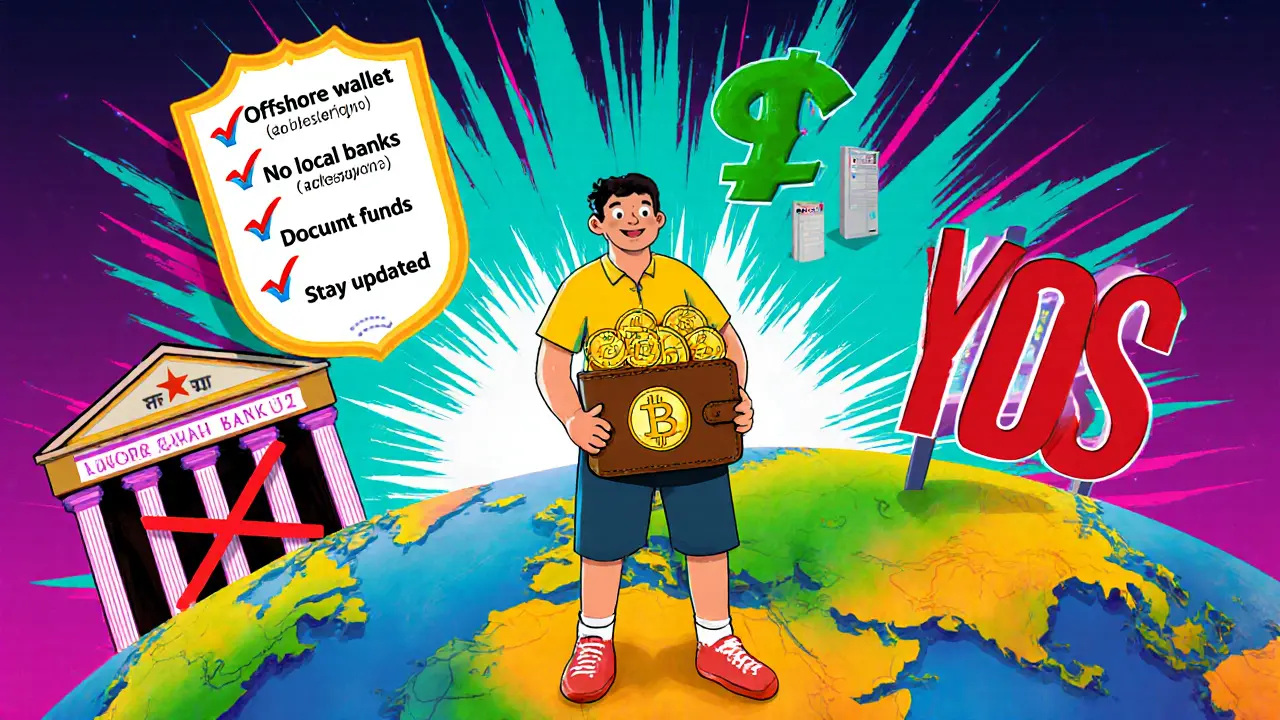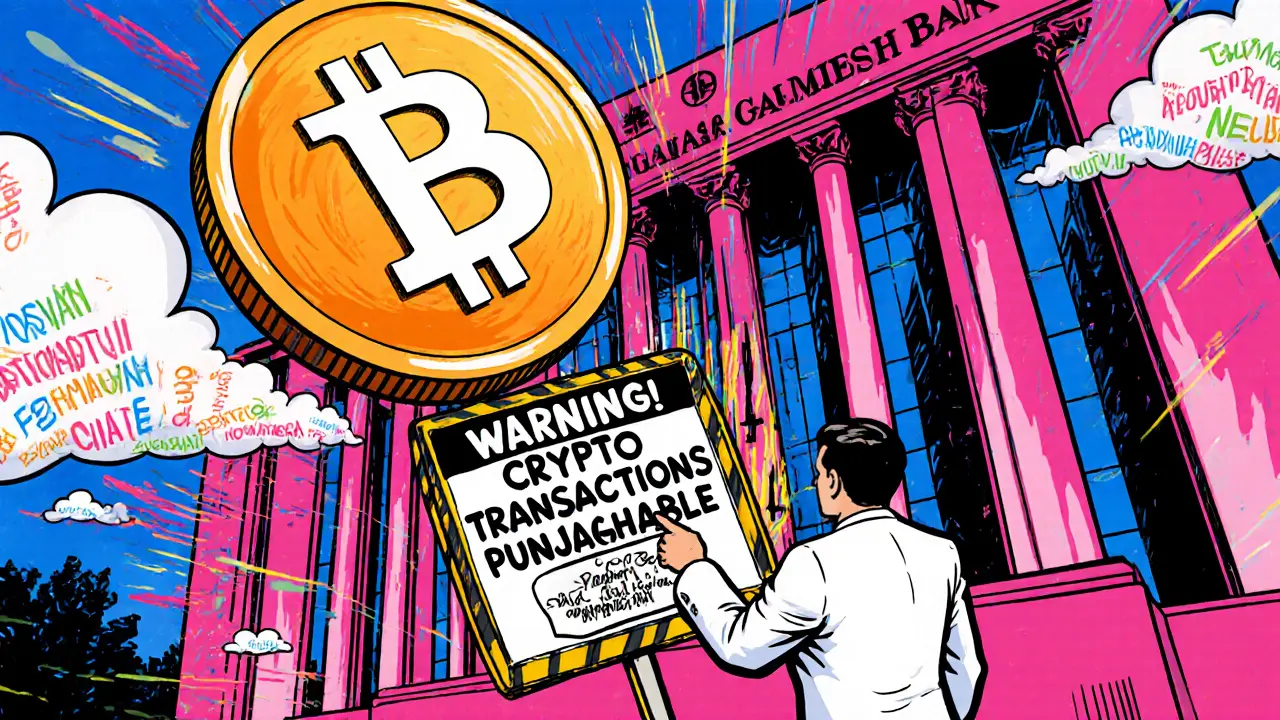Bangladesh Crypto Trading Risk Calculator
Assess Your Legal Risk
This calculator estimates your legal risk level based on your cryptocurrency trading activities in Bangladesh. The tool uses information from Bangladesh's financial regulations and enforcement practices.
Bangladesh cryptocurrency regulation is a collection of financial and anti‑terrorism statutes that authorities use to curb crypto‑related activity. While headlines often shout a "12‑year prison term" for anyone trading Bitcoin, the reality is a patchwork of warnings, overlapping laws, and selective enforcement. This guide untangles the legal maze, shows where the 12‑year figure comes from, and tells you what the actual risk looks like for a trader in Bangladesh today.
How the 12‑Year Figure First Appeared
On 1 September 2014 Bangladesh Bank issued its first cautionary notice about Bitcoin. The central bank’s statement warned that “Bitcoin is not a legal tender of any country. Any transaction through Bitcoin or any other crypto currency is a punishable offence.” In interviews with AFP, officials added that violations could lead to sentences of up to 12 years under the country’s anti‑money‑laundering framework.
The 12‑year number actually refers to the maximum term allowed by Money Laundering Prevention Act 2012 (amended 2015). Section 9(1) states that money‑laundering offences carry a jail term “not less than one year but which may extend to 10 years,” with fines up to 10 lakh taka. Bangladesh Bank extrapolated this to 12 years in its public statements, creating a gap between statutory language and media headlines.
Regulatory Timeline: Notices and Laws
- 2014 - First Cautionary Notice: Bangladesh Bank warns against Bitcoin, cites AML laws.
- 2017 - Second Notice: Expands warning to include Ethereum, Ripple, Litecoin and adds the Anti‑Terrorism Act 2009 as a possible basis for prosecution.
- 2020 - National Blockchain Strategy: Government explores blockchain use while still urging citizens to avoid crypto trading.
- 2024 - March Directive: All commercial banks reiterate the prohibition on crypto transactions, but omit the 12‑year citation.
Each notice leans on three core statutes: the Foreign Exchange Regulation Act 1947 (FERA), the Money Laundering Prevention Act 2012, and the Anti‑Terrorism Act 2009. A fourth, newer law - the Digital Security Act 2018 (DSA) - adds penalties for unauthorized electronic transactions.
Legal Basis: What the Statutes Actually Say
| Statute | Relevant Section | Maximum Penalty |
|---|---|---|
| Foreign Exchange Regulation Act 1947 | Section 3 & Section 14 | Up to 2 years (first offence), up to 5 years (repeat) |
| Money Laundering Prevention Act 2012 (amended 2015) | Section 9(1) | Up to 10 years + fine up to 10 lakh taka |
| Anti‑Terrorism Act 2009 | Section 30 | Up to 14 years for financing terrorism activities |
| Digital Security Act 2018 | Section 30 | Up to 5 years (first), up to 7 years (repeat) + fine |
The table shows that none of the laws explicitly mention “cryptocurrency” - they target foreign exchange violations, money‑laundering, and terrorism financing. In practice, prosecutors can argue that using crypto to move funds falls under these broader categories.
Enforcement Reality: Are People Really Getting 12‑Year Sentences?
As of October 2025, there are no publicly documented cases of a Bangladeshi citizen receiving a 12‑year sentence **solely** for crypto trading. The Anti‑Money Laundering Department’s 2022 annual report listed 37 digital‑financial‑crime cases, none of which listed cryptocurrency as the primary charge. The Cyber Security Division recorded 17 crypto‑related prosecutions in 2024, with maximum sentences ranging between 2 and 5 years - typical of general financial‑crime punishments.
Nevertheless, the legal framework *does* permit harsh punishment if crypto is used in conjunction with money‑laundering or terrorism financing. For example, a large‑scale P2P operation that moves illicit funds via Bitcoin could be charged under the Anti‑Terrorism Act and face up to 14 years.

Market Activity vs. Regulatory Stance
Despite the stern warnings, Bangladesh’s crypto market has blossomed. Chainalysis reported a 206 % year‑over‑year increase in transaction volume between July 2021 and June 2022, placing the country 15th globally in adoption metrics. Statista estimates that 2.1 million Bangladeshis owned some form of crypto by December 2024 - roughly 1.2 % of the population.
This divergence creates a “gray zone”: authorities have the power to levy heavy sentences, but they tend to target high‑value or clearly illicit operations rather than everyday traders swapping Bitcoin on peer‑to‑peer platforms.
Common Misconceptions About the 12‑Year Penalty
- Myth: Any crypto transaction automatically triggers a 12‑year jail term.
Fact: The 12‑year figure is an upper bound under money‑laundering statutes, only applied when the transaction is proven to be part of a laundering scheme. - Myth: Bangladesh has a specific law banning crypto.
Fact: No crypto‑specific legislation exists; existing financial and security laws are repurposed. - Myth: Owning crypto abroad is illegal.
Fact: The law focuses on transactions **through** Bangladeshi financial channels. Holding crypto on an overseas exchange is not expressly prohibited, though moving funds into Bangladesh can attract scrutiny.
Practical Advice for Residents and Travelers
- Use offshore wallets. Keep private keys and exchange accounts outside Bangladesh’s jurisdiction.
- Avoid using local banks. Any fiat‑to‑crypto conversion that goes through a Bangladeshi bank may be treated as a FERA violation.
- Document the source of funds. If you can prove that crypto purchases were funded by legitimate income, you reduce the risk of money‑laundering accusations.
- Stay updated on official notices. Bangladesh Bank occasionally releases new directives; ignore them at your own peril.
- Consider legal counsel. For sizable activities (e.g., running a P2P exchange), consult a lawyer familiar with the Money Laundering Prevention Act and the Digital Security Act.
Following these steps does not guarantee immunity, but it aligns your behavior with the spirit of the regulations and limits exposure to the harshest penalties.

Regional Context: How Bangladesh Compares
Neighbouring China imposed a total ban in 2021, with penalties ranging up to 7 years for crypto‑related fraud. India, on the other hand, moved from a tentative ban to a taxation regime in 2023, imposing a 30 % tax on crypto gains. Bangladesh sits somewhere in the middle - a strong public stance against trading, yet without a stand‑alone prohibition.
Future Outlook
Bangladesh’s 2020 National Blockchain Strategy signals interest in the underlying technology while keeping crypto trading out of the legal framework. International bodies like the Financial Action Task Force have highlighted inconsistencies in AML/CFT application, urging clearer guidance. If the government eventually drafts dedicated crypto legislation, the 12‑year figure could either be codified or replaced with a more nuanced penalty structure.
Key Takeaways
- The “12‑year” jail term is an interpreted maximum under existing AML law, not a specific crypto‑only penalty.
- No confirmed 12‑year sentences have been handed down purely for crypto trading as of 2025.
- Enforcement focuses on large‑scale or clearly illicit operations, not ordinary peer‑to‑peer swaps.
- Staying offshore, avoiding local banks, and keeping thorough records minimize legal exposure.
Is cryptocurrency illegal in Bangladesh?
Cryptocurrency is not designated as legal tender, and there is no specific law banning its ownership. However, using it to move money through Bangladeshi financial channels can violate existing AML, FERA, and anti‑terrorism statutes, which carry heavy penalties.
Where does the 12‑year imprisonment figure come from?
The number is derived from the maximum term allowed under the Money Laundering Prevention Act 2012 (amended 2015). Bangladesh Bank cited this upper limit in its 2014 warning, but the statute itself caps money‑laundering sentences at 10 years, not 12.
Have anyone actually received a 12‑year sentence for crypto trading?
No public records show a 12‑year jail term handed down solely for cryptocurrency trading. Reported crypto‑related cases in 2022‑2024 resulted in sentences between 2 and 5 years, consistent with general financial‑crime penalties.
What legal statutes could be used against a crypto trader?
Authorities can invoke the Foreign Exchange Regulation Act 1947, Money Laundering Prevention Act 2012, Anti‑Terrorism Act 2009, and the Digital Security Act 2018. The specific charge depends on how the transaction is framed - e.g., as foreign‑exchange violation, money‑laundering, or terrorism financing.
How can I reduce my risk if I still want to hold crypto?
Keep wallets and exchange accounts outside Bangladesh, avoid using local banks for fiat‑crypto conversion, maintain clear records of fund sources, and consult a lawyer if you run a sizable operation. These steps align with existing regulations and lower the chance of being deemed a money‑laundering case.

Write a comment